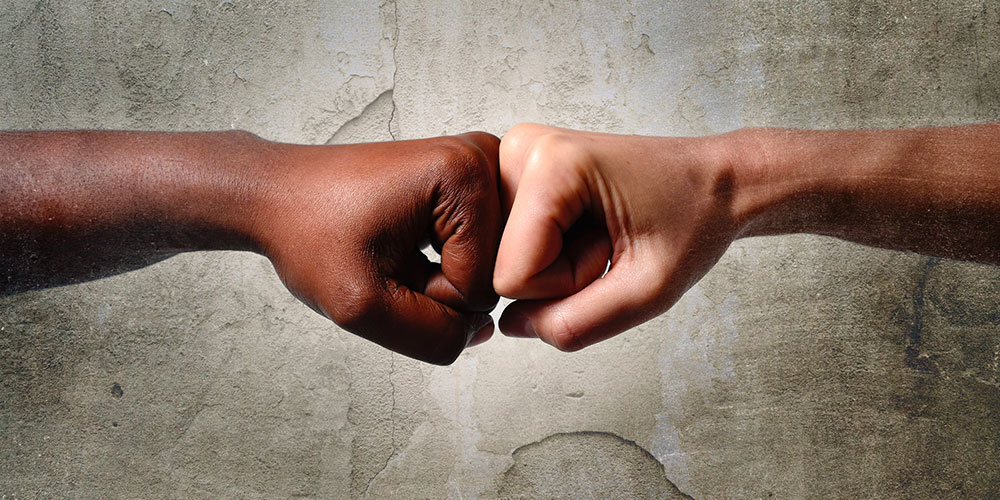
You were shocked by George Floyd’s death. The scene of the black American begging the policeman who had his knee on his neck “I can’t breathe” haunts you.
You don’t tolerate discrimination. You want justice. You’re a pacifist. You know that silence is not the answer.
Silence in the face of discrimination is more contagious than COVID-19. Silence in the face of discrimination digs deep roots and has repercussions that without a single sigh or action are perpetuated from generation to generation.
So that you’ll be ready to speak out with the courage of your convictions the next time you witness racism, I spoke with Professor Emeritus Timothy J. Stanley, PhD, who specializes in anti-racist education at the University of Ottawa.
According to Professor Stanley, the solution is to create inclusions instead of exclusions. “Racism is the exclusion of certain people. In the long term, it’s up to our families, our work teams and our communities to create these inclusions. As we did with the #MeToo movement, among others, we also need to take victims seriously.” He also adds that police officers, teachers and all others in authority need to be educated to intervene, report a peer and stop discrimination in action.
The important thing is not to let it go. Interrupt or choose an opportune moment.
Affirm your discomfort “I’m not comfortable with what I heard you say. I’m uncomfortable.”
If the other trivializes, “It’s just a joke,” follow up with, “I know you’re a good person. But if someone from this group were here, I don’t think you would have told that one.”
Educate. “These words exclude certain people. The result is unequal treatment. These effects are racist. They are inappropriate within our family.”
Depending on your relationship with the person, a simple “Oh my! What did you just say?” may be enough to make the other person aware of the seriousness of what they’re saying.
Evaluate the consequences. Could there be reprimands? Ask yourself if this is the right time. Will you be moved by the weather? Do you risk escalating the incident? Think about the partners who could support you in reporting racism, such as the human resources department, your supervisor, the ombudsman or the employee hotline.
If you’re on good terms with this colleague, you might say “I’m surprised to hear you say that.” This allegation will make the other person think again, giving them a chance to correct themselves or apologize.
If you don’t want to be seen in a positive light, like a friend, entrust the task to your partners mentioned above.
Within a group conversation, “I don’t feel comfortable with these remarks.” Professor Stanley advises that you then observe and give way to the reactions of others. Then, if no one can stand you, calmly explain why you feel uncomfortable.
If the aggressor is someone who is not in authority, Professor Stanley recommends focusing your efforts not on the aggressor, but rather on the victim. To minimize the risk of escalating the incident, don’t look at or interfere with the aggressor. Take the victim’s side.
Look at the victim. Smile. Engage her in friendly conversation to show your support: the weather, a compliment or a remark about the book you’re reading. No matter how banal, this conversation announces your solidarity. The victim is no longer alone and excluded. You include yourself in it. There are now two of you. Accompany her to neutral ground or until she tells you it’s okay.
If you witness a scene with a person in authority, to prevent it from getting out of hand, the recommendation is to record the scene and report the facts.
To avoid being a stunned spectator, practice the above scenarios with your circle of friends.
If you’re a teacher, prepare some role-playing exercises for your students.
If you’re a manager, include this topic in one of your virtual meetings. This video https://youtu.be/wKeITMzMn7w can be used as an ice-breaker to encourage conversation in advance of the presentation of your policy and organizational procedures for reporting discrimination.
Since I’m privileged, with white skin, I turned to a friend, a colleague with black skin, to prepare you to denounce. Host and producer Sabine Daniel asks for an empathetic perspective. Imagine being perceived as a threat just because of the color of your skin, especially if you’re a man. Imagine your father, your brother, your husband, your cousin, your friend not being seen for all that he is and why you love him.
Denounce. Now you know how.
Are you in a sticky situation? This blog is at your service. Write to me at julie@julieblaiscomeau.com. Your situation may enlighten other readers.
Published veroniquecloutier.com June 5, 2020 (c) Julie Blais Comeau
